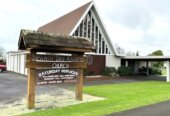The accord between Labour and National paves the way for softer rules around housing, and it is raising ire in Cambridge. We asked Taupo MP Louise Upston for her view.

Louise Upston
By Louise Upston
New Zealand has the some of the most unaffordable housing in the world and the impact of our housing shortage reaches right across our communities, leaving thousands homeless and fuelling the gap between those who own property and those who don’t.
Earlier this year during my community engagement sessions, housing was identified as a major issue in Cambridge.
National has been working with the Government to come up with a solution and late last month announced our policy that will help address the housing shortage through the Resource Management (Enabling Housing Supply) Bill.
This bill amends the Resource Management Act to make it easier to build more houses, reducing the time, cost and complexity of the resource consent process.
Council will need to allow more dense housing to be built through new intensification rules. These rules will allow buildings of up to three storeys on most sites from August 2022 without resource consent.
The legislation will not require more dwellings to be built. It is intended to be an enabler to build more houses which will offer residents more choices for where and how new housing can be built.
The Bill will still allow Councils to enforce restrictions to ensure sensible development, including requiring all new dwellings have a building consent, and requiring that no more than 50% of a section can be covered by buildings.
Lack of rentals and the high cost of those rental properties available to rent have also been identified through my various Friendly Forums and other engagement meetings held.
National has announced its policy in that space through the Boost Build-to-Rent Housing Bill – our plan to unlock investment in purpose-built rental housing, which will provide greater security of tenure, professional landlord services, and the experience of living in newly built accommodation.
I am aware of concerns raised by some Cambridge residents and councillors about the new bill and proposed “medium-density” zones that will enable more dwellings in existing suburbs.
While Cambridge has many character homes, and it is understandable that people will be concerned, the Waipā council will still be able to exclude some areas from the new density provisions if they can prove that area has a “qualifying matter” that makes the default level of density unsuitable, for example heritage designations, environmental issues and other matters that may make this level of density inappropriate in an area.
The Bill is also timely in that councils are considering their spatial, district and long-term plans which will allow community engagement on the provisions. Any concerns around a designation for a particular home can be raised with the council.
We need to do our bit to ensure a range of options is available – including affordable rentals, first homes for buyers and for smaller dwelling options for seniors sizing down.
I am excited about the two pieces of legislation as together they will help address an issue that has become dire for many – lack of affordable housing and rental properties.









